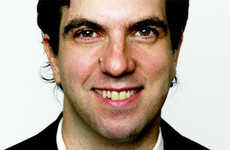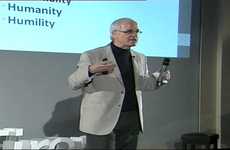
James Abruzzo Keynotes
The keynotes by James Abruzzo consider his work as a writer, educator and management consultant....

Need Inspiration?
Get inspired by 4,000+ keynote speaker videos & our founder, a top keynote speaker on innovation.
James Abruzzo's Ethical Artistry Talk Demands a Code of Ethics
Vasiliki Marapas — May 12, 2014 — Keynote Trends
References: youtube
In his ethical artistry talk, James Abruzzo recognizes the demand for a code of ethics in the performing arts. Every professional operates under a code of ethics, from doctors to lawyers. However, this fundamental code is conspicuously missing from the performing arts sector. Conflicts within the industry are shrouded in ambiguity and uncertainty.
Abruzzo uses the example of Diane Paulus, a New York theater director who re-imagined the classic opera 'Porgy and Bess.' Paulus decided to take the opera in a more modern direction; however, she also altered the ending and the music. While Paulus certainly has the artistic freedom to make these changes, Abruzzo wonders whether she can still, in good conscience, call the work 'Porgy and Bess.' Considering its wide-spread dissemination, will there one day be a generation of people who think that Paulus' version is the original? In another example, a Berlin director injected the figure of Mohammed into a Mozart opera, a decision considered by many to be "sacrilegious."
While he doesn't want to be pedantic, Abruzzo feels there needs to be a code of ethics to fall back on in cases of moral dilemma. He calls for the professionals within the performing arts to start a dialogue about what constitutes ethical and non-ethical behavior.
Abruzzo uses the example of Diane Paulus, a New York theater director who re-imagined the classic opera 'Porgy and Bess.' Paulus decided to take the opera in a more modern direction; however, she also altered the ending and the music. While Paulus certainly has the artistic freedom to make these changes, Abruzzo wonders whether she can still, in good conscience, call the work 'Porgy and Bess.' Considering its wide-spread dissemination, will there one day be a generation of people who think that Paulus' version is the original? In another example, a Berlin director injected the figure of Mohammed into a Mozart opera, a decision considered by many to be "sacrilegious."
While he doesn't want to be pedantic, Abruzzo feels there needs to be a code of ethics to fall back on in cases of moral dilemma. He calls for the professionals within the performing arts to start a dialogue about what constitutes ethical and non-ethical behavior.
0.5
Score
Popularity
Activity
Freshness
















